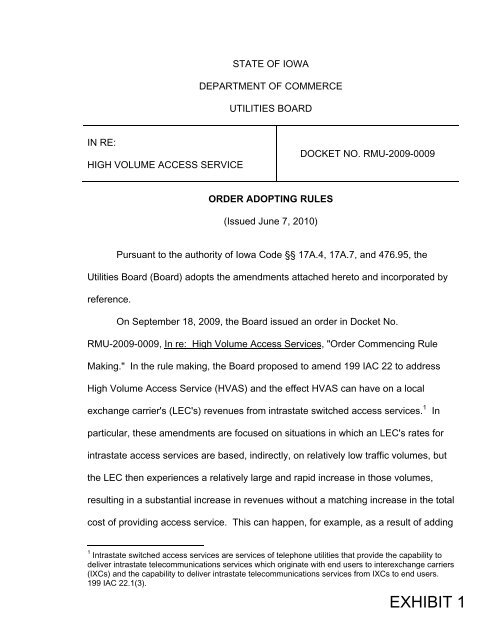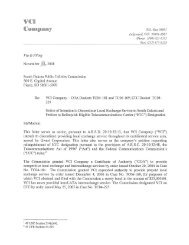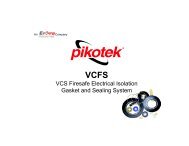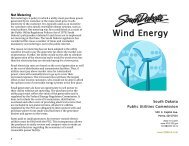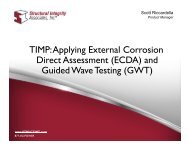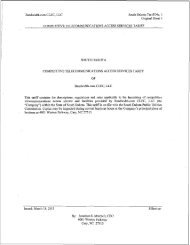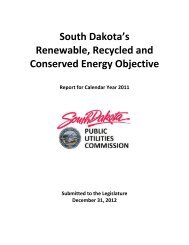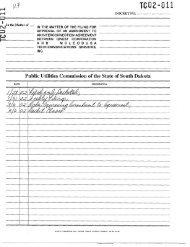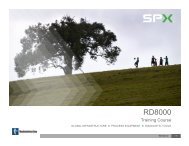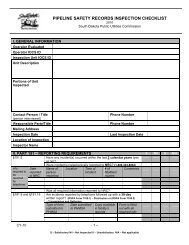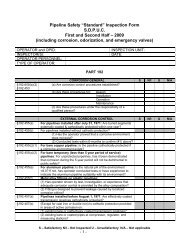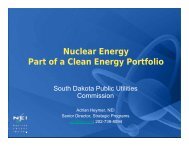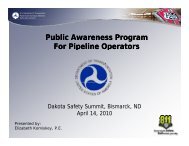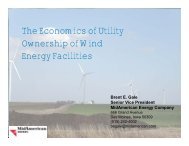Exhibit 1 - South Dakota Public Utilities Commission
Exhibit 1 - South Dakota Public Utilities Commission
Exhibit 1 - South Dakota Public Utilities Commission
You also want an ePaper? Increase the reach of your titles
YUMPU automatically turns print PDFs into web optimized ePapers that Google loves.
IN RE:<br />
HIGH VOLUME ACCESS SERVICE<br />
STATE OF IOWA<br />
DEPARTMENT OF COMMERCE<br />
UTILITIES BOARD<br />
ORDER ADOPTING RULES<br />
(Issued June 7, 2010)<br />
DOCKET NO. RMU-2009-0009<br />
Pursuant to the authority of Iowa Code §§ 17A.4, 17A.7, and 476.95, the<br />
<strong>Utilities</strong> Board (Board) adopts the amendments attached hereto and incorporated by<br />
reference.<br />
On September 18, 2009, the Board issued an order in Docket No.<br />
RMU-2009-0009, In re: High Volume Access Services, "Order Commencing Rule<br />
Making." In the rule making, the Board proposed to amend 199 IAC 22 to address<br />
High Volume Access Service (HVAS) and the effect HVAS can have on a local<br />
exchange carrier's (LEC's) revenues from intrastate switched access services. 1 In<br />
particular, these amendments are focused on situations in which an LEC's rates for<br />
intrastate access services are based, indirectly, on relatively low traffic volumes, but<br />
the LEC then experiences a relatively large and rapid increase in those volumes,<br />
resulting in a substantial increase in revenues without a matching increase in the total<br />
cost of providing access service. This can happen, for example, as a result of adding<br />
1 Intrastate switched access services are services of telephone utilities that provide the capability to<br />
deliver intrastate telecommunications services which originate with end users to interexchange carriers<br />
(IXCs) and the capability to deliver intrastate telecommunications services from IXCs to end users.<br />
199 IAC 22.1(3).<br />
EXHIBIT 1
DOCKET NO. RMU-2009-0009<br />
PAGE 2<br />
an HVAS customer that offers conference bridges, chat lines, help desks, or other<br />
services that are based upon high volumes of incoming or outgoing interexchange<br />
calls. The result is an increase in the LEC's access service minutes, which leads in<br />
turn to a matching increase in the amount the LEC bills to interexchange carriers<br />
(IXCs) for switched access services. When this situation is actively pursued by the<br />
LEC, it is sometimes referred to as "access stimulation."<br />
A "Notice of Intended Action" was published in the Iowa Administrative Bulletin<br />
at IAB Vol. XXXII, No. 8 (10/07/2009), p. 1022, as ARC 8227B. Written comments<br />
were filed on or before October 27, 2009, by the following participants: Iowa<br />
Telecommunications Association (ITA); Rural Iowa Independent Telephone<br />
Association (RIITA); Iowa Association of Municipal <strong>Utilities</strong> (IAMU); Reasnor<br />
Telephone Company (Reasnor); Aventure Communication Technology, LLC<br />
(Aventure); Greenway Communications, LLC (Greenway); Qwest Communications<br />
Corporation (QCC); AT&T Communications of the Midwest, Inc. (AT&T); MCImetro<br />
Access Transmission Services, LLC, d/b/a Verizon Access Transmission Services,<br />
and MCI Communications Services, Inc., d/b/a Verizon Business Services<br />
(collectively "Verizon"); Iowa Coalition of Access Payers 2 (ICAP); and the Consumer<br />
Advocate Division of the Department of Justice (Consumer Advocate). A public<br />
hearing to receive oral comments on the proposed amendments was held on<br />
December 8, 2009. On January 11, 2010, the Board issued an order allowing for<br />
2 The Iowa Coalition of Access Payers consists of Sprint Communications Corporation, LP; U.S.<br />
Cellular Corporation; T-Mobile Central, L.L.C.; and Level 3 Communications, LLC.
DOCKET NO. RMU-2009-0009<br />
PAGE 3<br />
additional comments on the proposed rules. Additional comments were filed by<br />
Consumer Advocate, ITA, RIITA, QCC, AT&T, Verizon, ICAP, and two additional<br />
participants, XO Communications Services, Inc. (XO Communications), and<br />
McLeodUSA Telecommunications Services, Inc., d/b/a PAETEC Business Services<br />
(PAETEC).<br />
This order will summarize the comments received about the proposed rules<br />
and will explain any revisions made to the rules. Other editorial changes may be<br />
made by the Code Editor before publication. The final version of the adopted<br />
amendments will be available in the Iowa Administrative Bulletin. These<br />
amendments will become effective on August 4, 2010.<br />
BACKGROUND<br />
The Federal Communications <strong>Commission</strong> (FCC) has described access<br />
stimulation and the economic incentives for it under the federal system of rate<br />
regulation as follows:<br />
Oversimplifying somewhat, to establish their rates, rate-ofreturn<br />
carriers calculate a revenue requirement, which is<br />
intended to recover expenses plus a reasonable rate of<br />
return. Once the revenue requirement is determined,<br />
carriers propose prices for all interstate services, which,<br />
when multiplied by historical or projected demand, are<br />
targeted to equal the revenue requirement. If, after rates are<br />
set, actual demand and expenses differ from the estimated<br />
demand and expenses, the realized rate-of-return may be<br />
greater or less than the targeted rate of return. The limited<br />
information we have suggests that, in certain instances,<br />
some LECs are experiencing dramatic increases in demand<br />
for switched access services. If the average cost per minute<br />
falls as demand grows, the realized rates of return are likely
DOCKET NO. RMU-2009-0009<br />
PAGE 4<br />
to exceed the authorized rate of return and thus the tariffed<br />
rates become unjust and unreasonable at some point. It is<br />
well established that there is a large fixed cost to purchasing<br />
a local switch and that the marginal or incremental cost of<br />
increasing the capacity of a local switch is low (some<br />
contend that it is zero) and certainly less than the average<br />
cost per minute of the local switch. Thus, if the average<br />
revenue per minute remains constant as demand grows, but<br />
the average cost per minute falls (which occurs if the<br />
marginal cost per minute is less than the average cost per<br />
minute) then profits (or return) will rise. This principle is<br />
equally applicable to all LECs. Moreover, the cost of local<br />
switching increases incrementally, while the price for local<br />
switching is established based on average costs, which are<br />
significantly higher. As a result, most of the switch costs are<br />
recovered by the demand used to establish the local<br />
switching rate. Carriers offering tandem switching services<br />
would experience a similar effect for their tandem switching<br />
costs. Accordingly, when local switching demand increases<br />
significantly, a carrier’s increased revenues generally will<br />
exceed any cost increases. As a result, a carriers’ rate of<br />
return at some point is likely to exceed the maximum allowed<br />
rate of return, making the rates unjust and unreasonable.<br />
A similar effect to that associated with local switching would<br />
also occur in the transport segment of the exchange access<br />
network. As demand increases, the number of circuits<br />
needed for transmission will increase. Again, the<br />
incremental cost is lower than the average cost (although the<br />
disparity is likely not as great as in the local switching case),<br />
which would lead to the rates for transport becoming<br />
unreasonable at some point as demand increases.<br />
In the Matter of Establishing Just and Reasonable Rates for Local Exchange<br />
Carriers, WC Docket No. 07-135, "Notice of Proposed Rulemaking" at 14-15 (FCC<br />
October 2, 2007) (hereinafter the FCC Notice).<br />
The system in Iowa is slightly different because the Board does not have rate<br />
regulation jurisdiction over a LEC's intrastate access charges to the same extent as
DOCKET NO. RMU-2009-0009<br />
PAGE 5<br />
the FCC has over interstate access charges. Iowa Code § 476.11 gives the Board<br />
jurisdiction over the terms and procedures under which toll (or interexchange)<br />
communications are interchanged, but only after a written complaint is filed by one of<br />
the telephone companies involved. This complaint-based jurisdiction means the<br />
Board is unable to order individual LECs to file new tariffs for switched access service<br />
rates on its own initiative, as the FCC has proposed to do in the FCC Notice. Thus,<br />
while the Board is aware of the FCC Notice and has given it consideration when<br />
preparing this order, the Board is not proposing to adopt the same type of rules that<br />
the FCC has described.<br />
Even in a reduced-regulation environment, the cost of filing an individual<br />
intrastate access service tariff for each LEC can be substantial. Filing costs are<br />
particularly important when those costs are being spread over a fairly small customer<br />
base, resulting in a relatively large cost per customer. In order to reduce that burden,<br />
the Board has adopted rules that allow associations of local exchange utilities to file<br />
intrastate access service tariffs. Non-rate-regulated local exchange utilities may then<br />
concur in the association tariff. See 199 IAC 22.14(2)(b)(1). Most small LECs have<br />
opted into the association tariff filed with the Board by ITA. The access rates<br />
contained in ITA's intrastate tariff have generally mirrored interstate rates filed by the<br />
National Exchange Carrier Association (NECA) with the FCC. However, when NECA<br />
began the process of reducing some of its interstate rates, ITA elected not to adopt<br />
the reduced rates in its intrastate tariff.
DOCKET NO. RMU-2009-0009<br />
PAGE 6<br />
In July of 2007, several IXCs filed objections to rate changes proposed by ITA<br />
for its intrastate access tariff. After holding formal contested case proceedings on the<br />
proposed changes, the Board ordered certain of the rates in ITA’s intrastate tariff to<br />
be set at the same level as NECA’s current rates for those elements. 3 Those rates in<br />
ITA’s intrastate tariff continue to be based on the NECA rates, which are supported<br />
by interstate costs. This has been a cost-effective method of setting intrastate rates<br />
in the ITA tariff, but it did not allow for the possible effect of HVAS.<br />
All elements of association tariffs are subject to Board review and approval,<br />
pursuant to 199 IAC 22.14(2)(b)(2). These rules give the Board jurisdiction to<br />
address the HVAS situation as it arises under an association tariff. Because HVAS<br />
situations tend to be fact-sensitive and individualized, the Board has concluded that<br />
HVAS calls should not be billed for access services pursuant to an association tariff.<br />
Under the adopted rules, any LEC providing HVAS must file an individual tariff for<br />
that service (although it may continue to concur in an association tariff for all other<br />
access services).<br />
To the extent an individual LEC opts to file an individual tariff for intrastate<br />
access services, either HVAS only or for all such services, the Board's rate<br />
jurisdiction is limited to the circumstances specified in § 476.11. Even for those<br />
situations, however, the Board proposed to adopt rules setting out the standards by<br />
which it will rule on the reasonableness of an individual LEC tariff if a complaint is<br />
3 In re: Iowa Telecommunications Association, Docket Nos. TF-07-125, TF-07-139, "Final Order"<br />
(May 30, 2008).
DOCKET NO. RMU-2009-0009<br />
PAGE 7<br />
filed pursuant to § 476.11. To that end, the adopted rules specify certain procedures<br />
that will be required in order to ensure reasonable HVAS access rates, such as<br />
prohibiting the application of association access rates to HVAS traffic, a requirement<br />
to engage in good faith negotiations for intrastate access rates, and final Board<br />
approval of HVAS tariff provisions.<br />
The adopted rules define an HVAS situation in terms of a rapid increase in<br />
access volumes (access growth of more than 100 percent in six months). For<br />
established LECs, this should be an effective test. The Board realizes that a new<br />
entrant’s intrastate access billings are likely to exceed the HVAS threshold proposed<br />
in these rules even if the company is not engaged in true HVAS activities, simply<br />
because the company’s normal intrastate access volumes are likely to be increasing<br />
rapidly (when measured on a percentage growth basis). It has generally been the<br />
Board’s policy to issue a certificate of public convenience and necessity to a new<br />
entrant in the telecommunications industry in Iowa within six months of the date the<br />
new carrier plans to commence service to enable the company to apply for, and<br />
activate, new telephone numbers within the time permitted by the North American<br />
Numbering Plan. Under these adopted rules, a new entrant should provide notice to<br />
all affected carriers, pursuant to 199 IAC 22.14(2)"e," within the six-month period<br />
before it begins providing local exchange service. Under the same rule, any<br />
negotiations between the new entrant and interexchange utilities should conclude<br />
within 60 days. Therefore, a new entrant should be able to have an approved and
DOCKET NO. RMU-2009-0009<br />
PAGE 8<br />
effective access tariff on file with the Board by the time it begins providing service in<br />
Iowa.<br />
Item 1<br />
SUMMARY OF COMMENTS AND<br />
DESCRIPTION OF AMENDMENTS ADOPTED<br />
In Item 1 of the proposed rules, the Board included a new definition in 199 IAC<br />
22.1(3) for high volume access services, based upon the effect a single customer, or<br />
group of similar customers, may have on a LEC's total access billings in a specified<br />
time frame. The proposal was that if a LEC's total access billings increase, or are<br />
expected to increase, by more than 100 percent in less than six months, there will be<br />
a presumption that an HVAS situation exists. The Board invited comment on whether<br />
this is an appropriate mechanism to identify HVAS situations and whether the<br />
proposed numerical thresholds are appropriate. The intent was to identify situations<br />
that represent a true HVAS without also including normal variations in access billings<br />
or typical levels of growth in access services.<br />
The Board proposed the following definition of HVAS:<br />
"High Volume Access Services" (HVAS) is any service that<br />
results in an increase in total billings for intrastate exchange<br />
access for a local exchange utility in excess of 100 percent<br />
in less than six months. By way of illustration and not<br />
limitation, HVAS typically results in significant increases in<br />
interexchange call volumes and can include chat lines,<br />
conference bridges, call center operations, help desk<br />
provisioning, or similar operations. These services may be<br />
advertised to consumers as being free or for the cost of a<br />
long distance call. The call service operators often provide<br />
marketing activities for HVAS in exchange for direct
DOCKET NO. RMU-2009-0009<br />
PAGE 9<br />
payments, revenue sharing, concessions, or commissions<br />
from local service providers.<br />
The Board received comments from several parties regarding the proposed<br />
threshold of 100 percent increase in less than six months as a means of identifying<br />
an HVAS situation. ITA, RIITA, IAMU, and Reasnor expressed concern that<br />
temporary, one-time spikes in toll traffic could trigger an HVAS proceeding.<br />
Greenway noted that a new entrant to the Iowa telecommunications market might be<br />
subject to an HVAS proceeding because its start-up operation could potentially see a<br />
100 percent increase in less than six months of initiating service. Verizon and ICAP,<br />
however, argued that a 100 percent increase in six months is too high; they proposed<br />
a 25 percent increase in access billings as an identifier of an HVAS situation.<br />
In its January 11, 2010, order allowing for additional comments, the Board<br />
asked whether the rules should preclude revenue sharing agreements as an<br />
alternative means to identify or discourage HVAS situations. Both<br />
XO Communications and PAETEC cautioned the Board against banning revenue<br />
sharing agreements stating that there are legitimate business arrangements that<br />
could be implicated under such a prohibition. Consumer Advocate agreed that a<br />
complete prohibition on revenue sharing agreements would be overbroad.<br />
From this record it is clear that there is no single, accurate number for the<br />
threshold for an HVAS situation. Instead, there is a range of reasonable alternatives,<br />
as evidenced by comments saying 100 percent is too low and other comments<br />
saying is too high. The Board will implement the rules as proposed, with a 100
DOCKET NO. RMU-2009-0009<br />
PAGE 10<br />
percent increase in less than six months threshold, which is within the range<br />
supported by the comments. If it becomes clear that this threshold should be<br />
changed, the Board will adjust it in a future rule making.<br />
The Board finds that a blanket prohibition on revenue sharing agreements<br />
could result in unintended consequences in the form of prohibiting legitimate<br />
business arrangements (sales on commission, for example). The Board will not alter<br />
this rule to ban such agreements.<br />
Item 2<br />
Item 2 of the proposed rules addresses association tariffs and requires that<br />
such tariffs prohibit the application of association tariff rates to HVAS. The Board<br />
proposed the following amendment to paragraph 22.14(2)"d":<br />
(8) A provision prohibiting the application of association<br />
access service rates to HVAS traffic.<br />
There was general support by the participants for the rule as proposed in<br />
Item 2. Verizon, however, suggested that further audit and accountability<br />
requirements are necessary to maintain compliance with the proposed rule. Verizon<br />
supports the adoption of a requirement that LECs provide annual certifications to the<br />
Board that they are not engaged in illegitimate traffic pumping.<br />
The Board requested additional comments on the issue of LEC certifications in<br />
its January 11, 2010, order. In general, most LECs were opposed to certifications<br />
while some of the IXCs and ICAP were in favor of certifications. ICAP also argued
DOCKET NO. RMU-2009-0009<br />
PAGE 11<br />
that any certification would need to be tied to an enforcement mechanism to be<br />
meaningful.<br />
Consumer Advocate opposed certifications, stating that carriers involved in<br />
HVAS may be able to provide certifications by relying on their own interpretations of<br />
the rule. Consumer Advocate asserted that the continued vigilance of IXCs will be<br />
required to uncover and address HVAS abuses. RIITA argued that a certification<br />
mechanism would be another regulatory burden on small telephone companies.<br />
The Board will adopt the rule under Item 2 as originally proposed. The<br />
additional comments have persuaded the Board that a certification process will not<br />
be an effective means of verifying compliance with the rule because certifications<br />
could be subject to individual interpretation and, therefore, would not be an effective<br />
mechanism. In addition, the Board is sensitive to adopting rules that increase the<br />
number of compliance filings on small utilities. The Board will monitor the<br />
effectiveness of these rules and will determine whether future modifications are<br />
necessary based on the experience gained from implementing these rules.<br />
Item 3<br />
In Item 3, the Board proposed new paragraph 22.14(2)"e" that would require<br />
LECs that are adding a new HVAS customer, or otherwise expecting or experiencing<br />
an HVAS situation, to notify the relevant IXCs of the telephone numbers involved<br />
and, for new customers, the expected date the HVAS service will be initiated. This<br />
notification will allow the IXCs to commence negotiations with the LEC regarding the<br />
terms and procedures for exchange of the HVAS toll traffic, with the possibility of
DOCKET NO. RMU-2009-0009<br />
PAGE 12<br />
seeking a Board resolution pursuant to Iowa Code § 476.11, if necessary. If the<br />
parties are able to negotiate new tariff provisions for HVAS, then this notice and<br />
negotiation period may also provide time for filing the agreed-upon tariff with the<br />
Board, prior to initiation of service. This timing is important; the LEC will have no<br />
access rate to apply to HVAS traffic until its individual HVAS tariff is accepted for<br />
filing and has become effective.<br />
The proposed rule also provides that if the Board has to resolve the matter in<br />
§ 476.11 proceedings, the access rates for toll traffic to the HVAS telephone numbers<br />
may be based on the incremental cost of providing the service, not including any<br />
marketing or other payments made to the HVAS customer. In order to accommodate<br />
the potential uncertainty associated with projected HVAS traffic volumes, the rule<br />
allows for the use of rate bands that will vary with different traffic levels, presumably<br />
with lower rates for higher volumes of HVAS traffic.<br />
paragraph:<br />
The Board proposed to amend subrule 22.14(2) by inserting the following new<br />
e. A local exchange utility that is adding a new HVAS<br />
customer or otherwise reasonably anticipates an HVAS<br />
situation shall notify interexchange utilities of the situation,<br />
the telephone numbers that will be assigned to the HVAS<br />
customer (if applicable), and the expected date service to<br />
the HVAS customer will be initiated, if applicable. Notice<br />
should be sent to each interexchange utility that paid for<br />
intrastate access services from the local exchange carrier in<br />
the preceding 12 months, by a method calculated to provide<br />
adequate notice. Any interexchange utility may request<br />
negotiations concerning the access rates applicable to calls<br />
to or from the HVAS customer.
DOCKET NO. RMU-2009-0009<br />
PAGE 13<br />
A local exchange utility that experiences an increase in<br />
intrastate access billings that qualifies as an HVAS situation,<br />
but did not add a new HVAS customer or otherwise<br />
anticipate the situation, shall notify interexchange utilities of<br />
the HVAS situation at the earliest reasonable opportunity, as<br />
described in the preceding paragraph. Any interexchange<br />
utility may request negotiations concerning whether the local<br />
exchange utility's access rates, as a whole or for HVAS<br />
services only, should be changed to reflect the increased<br />
access traffic.<br />
When a utility requests negotiations concerning intrastate<br />
access services, the parties shall negotiate in good faith to<br />
achieve reasonable terms and procedures for the exchange<br />
of traffic. No access charges shall apply to the HVAS traffic<br />
until an access tariff for HVAS is accepted for filing by the<br />
board and has become effective. At any time that any party<br />
believes negotiations will not be successful, any party may<br />
file a written complaint with the Board pursuant to section<br />
476.11. In any such proceeding, the Board will consider<br />
setting the rate for access services for HVAS traffic based<br />
upon the incremental cost of providing HVAS service,<br />
although any other relevant evidence may also be<br />
considered. The incremental cost will not include marketing<br />
or other payments made to HVAS customers. The resulting<br />
rates for access services may include a range of rates based<br />
upon the volume of access traffic or other relevant factors.<br />
Several participants provided comments on this proposed rule. ICAP asked<br />
that the notice requirements to an IXC of an HVAS situation, be expanded to include<br />
several additional types of carriers, such as wireless carriers, carriers providing<br />
underlying services for Voice over Internet Protocol (VoIP) services, and LECs<br />
authorized to provide service in the same exchange. The Board agrees and will<br />
revise the adopted rule to include "any carrier with whom the local exchange carrier<br />
exchanged traffic in the preceding 12 months, and all other local exchange carriers<br />
authorized to provide service in the subject to the first paragraph of 199 IAC 22.1(e)."
DOCKET NO. RMU-2009-0009<br />
PAGE 14<br />
ICAP also recommended that the Board and Consumer Advocate be notified<br />
of an HVAS situation involving negotiations between carriers and the filing of a<br />
proposed tariff. The Board does not find that it is necessary to notify the Board or<br />
Consumer Advocate prior to the commencement of HVAS negotiations since the<br />
Board would not be a party to those negotiations and Consumer Advocate would not<br />
normally be a party either. However, if the negotiations are successful and an HVAS<br />
tariff is filed, the Board and Consumer Advocate would receive notice of such a filing<br />
pursuant to the current rules governing the filing of tariffs. Alternatively, if the<br />
negotiations fail, the Board and Consumer Advocate would also receive notice if the<br />
parties seek Board resolution of the HVAS dispute pursuant to Iowa Code § 476.11.<br />
The Board will not revise the proposed rule to include this requirement.<br />
RIITA expressed concern that large carriers might ignore attempts by smaller<br />
carriers to enter negotiations over an HVAS situation. RIITA recommended that<br />
small carriers be allowed to file their HVAS tariffs after they provide notice. RIITA<br />
argues that if a carrier objects to an HVAS tariff, the standard process for challenging<br />
a tariff should be followed, including the collection of the proposed rate on a<br />
temporary basis, subject to refund if the proposed rate is not approved.<br />
However, QCC and Consumer Advocate recommended instead that the rules<br />
establish a 60-day timeframe for completing the HVAS negotiations and suggested<br />
that if negotiations are not successful, the parties could then petition the Board for an<br />
expedited proceeding. The Board finds this recommendation to be reasonable, as it<br />
strikes a balance between the need for time for negotiations and the need to prevent
DOCKET NO. RMU-2009-0009<br />
PAGE 15<br />
undue delay. Accordingly, the Board has incorporated a 60-day negotiation period in<br />
the proposed rule.<br />
In its January 11, 2010, order, the Board requested additional comments<br />
regarding a means by which new entrants could provide effective notice of an HVAS<br />
situation to the IXC community. AT&T and Consumer Advocate suggested that new<br />
entrants publish notice on the Board’s Web site. Consumer Advocate also suggested<br />
that a new entrant could provide notice to all IXCs that are billed by Iowa Network<br />
Services (INS). ICAP suggested that a new entrant use records that are kept by the<br />
Board to provide notice to affected carriers. Verizon asserted that new entrants<br />
should also notify wireless carriers, providers of Voice over Internet Protocol (VoIP)<br />
services, and all other LECs providing service in the service area.<br />
The Board finds that these suggestions do not provide a viable proposal for<br />
notifying IXCs of an HVAS situation. The Board will not allow other entities to post<br />
information on the Board’s Web site for purposes of legal notice. If an issue was to<br />
arise with a particular posting and the Board’s processes were somehow implicated,<br />
the Board’s ability to resolve the issue would be compromised. The proposals<br />
relating to identifying the entities to be notified are also rejected. INS records, Board<br />
records, and similar sources may be useful in identifying these entities, but it is not<br />
clear that any of them will be adequate in all situations.<br />
The first paragraph of the proposed rule provides that "notice shall be sent ...<br />
by a method calculated to provide adequate notice." Because the burden of<br />
providing adequate notice is the responsibility of the party proposing to provide
DOCKET NO. RMU-2009-0009<br />
PAGE 16<br />
HVAS services, the Board will not add a more specific notice mechanism to the<br />
proposed rules at this time, but will consider the issue on a case-by-case basis.<br />
The Board will also add a provision to the proposed rule whereby an IXC could<br />
file a complaint against a LEC if it believes the LEC is engaged in activity that raises<br />
HVAS issues, but the activity does not meet the "100 percent increase in less than<br />
six months" threshold. The Board will add the following paragraph to the adopted<br />
rule to provide for this situation:<br />
Item 4<br />
Any interexchange utility that believes a situation has<br />
occurred or is occurring that does not specifically meet the<br />
HVAS threshold requirements defined in subrule 22.1(3), but<br />
which raises the same general concerns and issues as an<br />
HVAS situation, may file a complaint with the board,<br />
pursuant to these rules.<br />
Item 4 is a proposed amendment to rule 22.20(5) that would allow the Board to<br />
revoke a LEC's certificate of public convenience and necessity, issued pursuant to<br />
Iowa Code § 476.29, for failure to address an HVAS situation as required by Board<br />
rules. This would be in addition to any other remedies or penalties that may be<br />
available to the Board in a particular proceeding, such as civil penalties. The Board<br />
does not intend to revoke a LEC's certificate for failure to properly forecast<br />
unexpected growth in access billings, but a LEC that is adding a conference calling<br />
customer or a customer that offers help desk services, for example, and fails to notify<br />
the IXCs as required by the rules may find its certificate at risk.
DOCKET NO. RMU-2009-0009<br />
PAGE 17<br />
The Board proposed the following amendment to subrule 22.20(5):<br />
Certificate revocation. Any five subscribers or potential<br />
subscribers, an interexchange utility, or consumer advocate<br />
upon filing a sworn statement showing a generalized pattern<br />
of inadequate telephone service or facilities may petition the<br />
board to begin formal certificate revocation proceedings<br />
against a local exchange utility. For the purposes of this<br />
rule, inadequate telephone service or facilities may include<br />
the failure to treat high-volume access (HVAS) charges in a<br />
manner consistent with the requirements of 199—<br />
2.14(2)"e"(476). While similar in nature to a complaint filed<br />
under rule 199—6.2(476), a petition under this rule shall be<br />
addressed by the board under the following procedure and<br />
not the procedure found in 199—Chapter 6.<br />
Several of the LECs expressed concern about the certificate revocation<br />
provision in the HVAS rules. ITA stated that the proposed rule conflicts with the<br />
intent of Iowa Code § 476.29(9), arguing that the Legislature tied revocation of<br />
certificates to inadequate service or facilities. According to ITA, the HVAS issue ties<br />
to appropriate rates, not service or facilities. IAMU stated that the proposed remedy,<br />
certificate revocation, is worse than the HVAS problem.<br />
AT&T, on the other hand, argued that certificate revocation may be an<br />
appropriate solution to an HVAS problem and Verizon stated that the Board already<br />
possesses the authority to revoke certificates pursuant to Iowa Code § 476.29.<br />
Verizon stated that the proposed change to subrule 22.20(5) should be expressed as<br />
recognition of the Board’s established revocation authority and not the creation of a<br />
new remedy.<br />
The Board agrees with AT&T and Verizon that the Board is vested with the<br />
authority to revoke certificates pursuant to Iowa Code § 476.29. The Board also finds
DOCKET NO. RMU-2009-0009<br />
PAGE 18<br />
that engaging in HVAS in an abusive manner is a serious problem for the<br />
telecommunications industry in Iowa. 4 Parties contemplating the provision of HVAS<br />
services should be notified of the potential consequences. Therefore, the Board<br />
disagrees with ITA and IAMU and will express its established authority to initiate<br />
certificate revocation proceedings against a LEC.<br />
Both Verizon and ICAP also asked for additional audit and accountability<br />
requirements to ensure compliance with the proposed HVAS rules. However, abuses<br />
in the switched access regime may be largely driven by the magnitude of interstate<br />
revenues, which typically represent larger sums than the intrastate revenue streams<br />
under the Board’s regulatory authority. Recently, the FCC has indicated its intent to<br />
begin the process of access charge reform through the National Broadband Plan<br />
(NBP). 5 The Board will not create additional accountability requirements in these<br />
rules at this time, but may do so if appropriate in the future.<br />
The Board will adopt the amendments as discussed in this order. The<br />
amendments will become effective on August 4, 2010.<br />
IT IS THEREFORE ORDERED:<br />
1. The rule making identified as Docket No. RMU-2009-0009 is adopted.<br />
4 See In re: Qwest Communications Corp, vs. Superior Tel. Coop, "Final Decision and Order," Docket<br />
No. FCU-07-2 (September 21, 2009); and In the Matter of Qwest Communications Corp. vs. Farmers<br />
and Merchants Mutual Tel. Co., FCC File No. EB-07-MD-001, "Second Order on Reconsideration"<br />
(November 25, 2009).<br />
5 See, "Connecting America: The National Broadband Plan," issued by the FCC on March 16, 2010.<br />
The National Broadband Plan can be downloaded at http://download.broadband.gov/plan/nationalbroadband-plan.pdf.
DOCKET NO. RMU-2009-0009<br />
PAGE 19<br />
2. The Executive Secretary is directed to submit for publication in the Iowa<br />
Administrative Bulletin an "Adopted and Filed" notice in the form attached to and<br />
incorporated by reference in this order.<br />
ATTEST:<br />
UTILITIES BOARD<br />
/s/ Robert B. Berntsen<br />
/s/ Krista K. Tanner<br />
/s/ Joan Conrad /s/ Darrell Hanson<br />
Executive Secretary<br />
Dated at Des Moines, Iowa, this 7 th day of June 2010.
UTILITIES DIVISION [199]<br />
Adopted and Filed<br />
Pursuant to Iowa Code sections 17A.4, 17A.7, and 476.95, the <strong>Utilities</strong> Board<br />
(Board) gives notice that on June 7, 2010, the Board issued an order in Docket No.<br />
RMU-2009-0009, In re: High Volume Access Services [199 IAC 22], "Order Adopting<br />
Rules," by which the Board adopted amendments to 199 IAC 22. The adopted rules<br />
address High Volume Access Service (HVAS) and the effect HVAS can have on a local<br />
exchange carrier's (LEC's) revenues from intrastate switched access services. 1 In<br />
particular, these amendments are focused on situations in which a LEC's rates for<br />
intrastate access services are based, indirectly, on relatively low traffic volumes, but the<br />
LEC then experiences a relatively large and rapid increase in those volumes, resulting<br />
in a substantial increase in revenues without a matching increase in the total cost of<br />
providing access service.<br />
A Notice of Intended Action was published in the Iowa Administrative Bulletin at IAB<br />
Vol. XXXII, No. 8 (10/07/2009) p. 1022, as ARC 8227B. Written comments were filed<br />
on or before October 27, 2009, by the following participants: Iowa Telecommunications<br />
Association (ITA); Rural Iowa Independent Telephone Association (RIITA); Iowa<br />
Association of Municipal <strong>Utilities</strong> (IAMU); Reasnor Telephone Company (Reasnor);<br />
Aventure Communication Technology, LLC (Aventure); Greenway Communications,<br />
1 Intrastate access services are services of telephone utilities that provide the capability to deliver<br />
intrastate telecommunications services which originate with end users to interexchange carriers (IXCs)<br />
and the capability to deliver intrastate telecommunications services from IXCs to end users. 199 IAC<br />
22.1(3).
LLC (Greenway); Qwest Communications Corporation (QCC); AT&T Communications<br />
of the Midwest, Inc. (AT&T); MCImetro Access Transmission Services, LLC, d/b/a<br />
Verizon Access Transmission Services, and MCI Communications Services, Inc., d/b/a<br />
Verizon Business Services (collectively “Verizon”); Iowa Coalition of Access Payers 2<br />
(ICAP); and the Consumer Advocate Division of the Department of Justice (Consumer<br />
Advocate).<br />
A public hearing to receive oral comments on the proposed amendments was held<br />
on December 8, 2009. On January 11, 2010, the Board issued an order allowing for<br />
additional comments on the proposed rules and proposals presented at the oral<br />
comment hearing. Additional written comments were filed by Consumer Advocate, ITA,<br />
RIITA, QCC, AT&T, Verizon, ICAP, and two additional participants, XO<br />
Communications Services, Inc. (XO Communications), and McLeodUSA<br />
Telecommunications Services, Inc., d/b/a PAETEC Business Services (PAETEC).<br />
A copy of the Board’s order and a summary of the oral and written comments, along<br />
with staff recommendations, are available through the Board’s electronic filing system,<br />
which can be accessed at http://efs.iowa.gov. Based on the comments submitted in this<br />
proceeding, the Board determined that the proposed amendments to 199 IAC 22 should<br />
be adopted with some modifications, as described in the order adopting rules.<br />
The Board does not find it necessary to propose a separate waiver provision in the<br />
rule making. The Board's general waiver provision in 199 IAC 1.3 is applicable to these<br />
amendments.<br />
2 The Iowa Coalition of Access Payers consists of Sprint Communications Corporation, LP; U.S. Cellular<br />
Corporation; T-Mobile Central, L.L.C.; and Level 3 Communications, LLC.<br />
2
These amendments are intended to implement Iowa Code sections 17A.4, 476.1,<br />
476.2, 476.4, 476.5, 476.11, and 476.95.<br />
The following amendments are adopted.<br />
Item 1. Adopt the following new definition of "High-volume access service (HVAS)"<br />
in subrule 22.1(3):<br />
"High-volume access service (HVAS)" is any service that results in an increase in<br />
total billings for intrastate exchange access for a local exchange utility in excess of 100<br />
percent in less than six months. By way of illustration and not limitation, HVAS typically<br />
results in significant increases in interexchange call volumes and can include chat lines,<br />
conference bridges, call center operations, help desk provisioning, or similar operations.<br />
These services may be advertised to consumers as being free or for the cost of a long-<br />
distance call. The call service operators often provide marketing activities for HVAS in<br />
exchange for direct payments, revenue sharing, concessions, or commissions from<br />
local service providers.<br />
Item 2. Adopt the following new subparagraph 22.14(2)"d"(8):<br />
(8) A provision prohibiting the application of association access service rates to<br />
HVAS traffic.<br />
Item 3. Adopt the following new paragraph 22.14(2)"e":<br />
e. A local exchange utility that is adding a new HVAS customer or otherwise<br />
reasonably anticipates an HVAS situation shall notify interexchange utilities provide<br />
notice of the situation, the telephone numbers that will be assigned to the HVAS<br />
customer (if applicable), and the expected date service to the HVAS customer will be<br />
initiated, if applicable. Notice should be sent to each interexchange utility that paid for<br />
3
intrastate access services from the local exchange carrier in the preceding 12 months,;<br />
to any carrier with whom the local exchange carrier exchanged traffic in the preceding<br />
12 months; and all other local exchange carriers authorized to provide service in the<br />
subject exchange; by a method calculated to provide adequate notice. Any<br />
interexchange utility may request negotiations concerning the access rates applicable to<br />
calls to or from the HVAS customer.<br />
Any interexchange utility that believes a situation has occurred or is occurring that<br />
does not specifically meet the HVAS threshold requirements defined in subrule 22.1(3),<br />
but which raises the same general concerns and issues as an HVAS situation, may file<br />
a complaint with the board pursuant to these rules.<br />
A local exchange utility that experiences an increase in intrastate access billings that<br />
qualifies as an HVAS situation, but did not add a new HVAS customer or otherwise<br />
anticipate the situation, shall notify interexchange utilities of the HVAS situation at the<br />
earliest reasonable opportunity, as described in the preceding paragraph. Any<br />
interexchange utility may request negotiations concerning whether the local exchange<br />
utility’s access rates, as a whole or for HVAS only, should be changed to reflect the<br />
increased access traffic.<br />
When a utility requests negotiations concerning intrastate access services, the<br />
parties shall negotiate in good faith to achieve reasonable terms and procedures for the<br />
exchange of traffic. No access charges shall apply to the HVAS traffic until an access<br />
tariff for HVAS is accepted for filing by the board and has become effective. At any time<br />
that any party believes negotiations will not be successful, any party may file a written<br />
complaint with the board pursuant to Iowa Code section 476.11. In any such<br />
4
proceeding, the board will consider setting the rate for access services for HVAS traffic<br />
based upon the incremental cost of providing HVAS, although any other relevant<br />
evidence may also be considered. The incremental cost will not include marketing or<br />
other payments made to HVAS customers. The resulting rates for access services may<br />
include a range of rates based upon the volume of access traffic or other relevant<br />
factors. Any interexchange carrier that believes a situation has occurred or is occurring<br />
that does not specifically meet the HVAS threshold requirements defined in subrule<br />
22.1(3), but which raises the same general concerns and issues as an HVAS situation,<br />
may file a complaint with the board.<br />
Item 4. Amend subrule 22.20(5), introductory paragraph, as follows:<br />
22.20(5) Certificate revocation. Any five subscribers or potential subscribers, an<br />
interexchange utility, or consumer advocate upon filing a sworn statement showing a<br />
generalized pattern of inadequate telephone service or facilities may petition the board<br />
to begin formal certificate revocation proceedings against a local exchange utility. For<br />
the purposes of this rule, inadequate telephone service or facilities may include the<br />
failure to bill high-volume intrastate access (HVAS) charges in a manner consistent with<br />
the requirements of 199 IAC 22.14. While similar in nature to a complaint filed under<br />
rule 199—6.2(476), a petition under this rule shall be addressed by the board under the<br />
following procedure and not the procedure found in 199—Chapter 6.<br />
June 7, 2010<br />
/s/ Robert B. Berntsen<br />
Robert B. Berntsen<br />
Chair<br />
5


